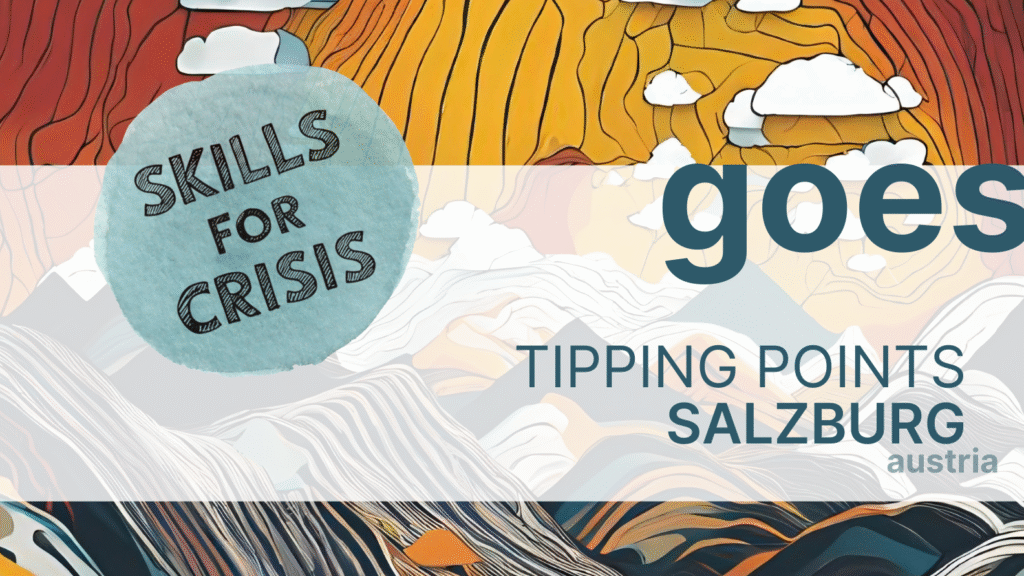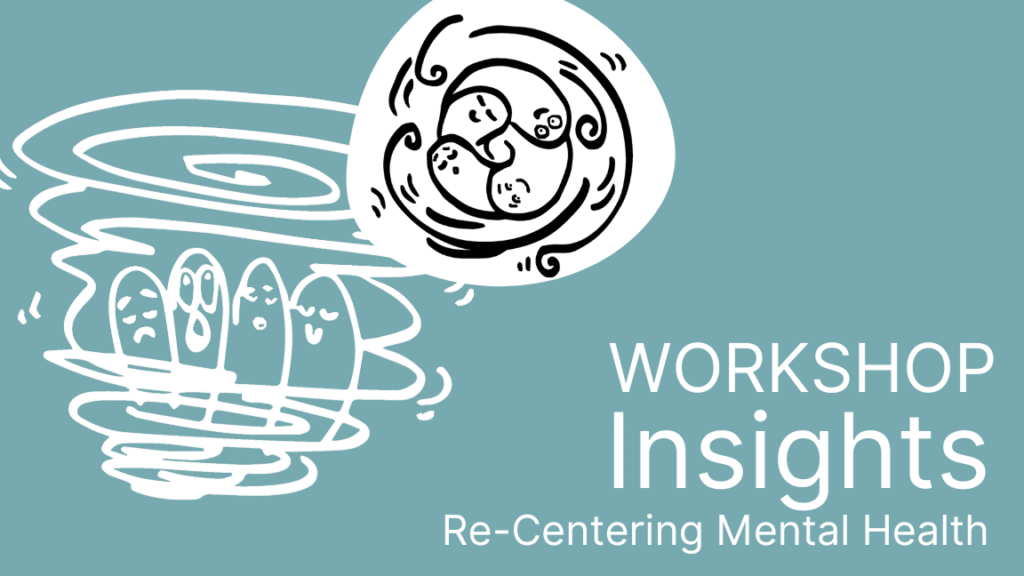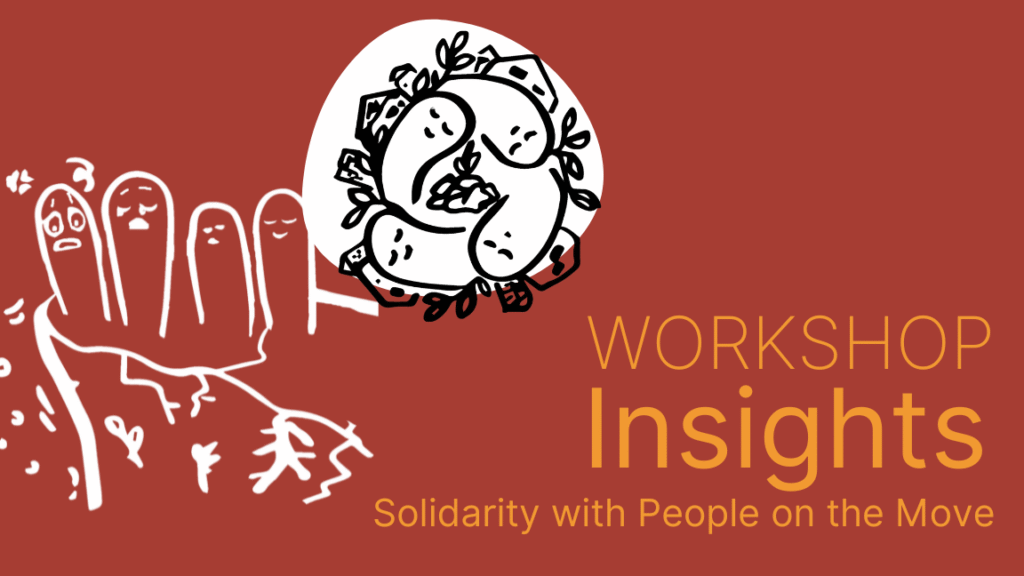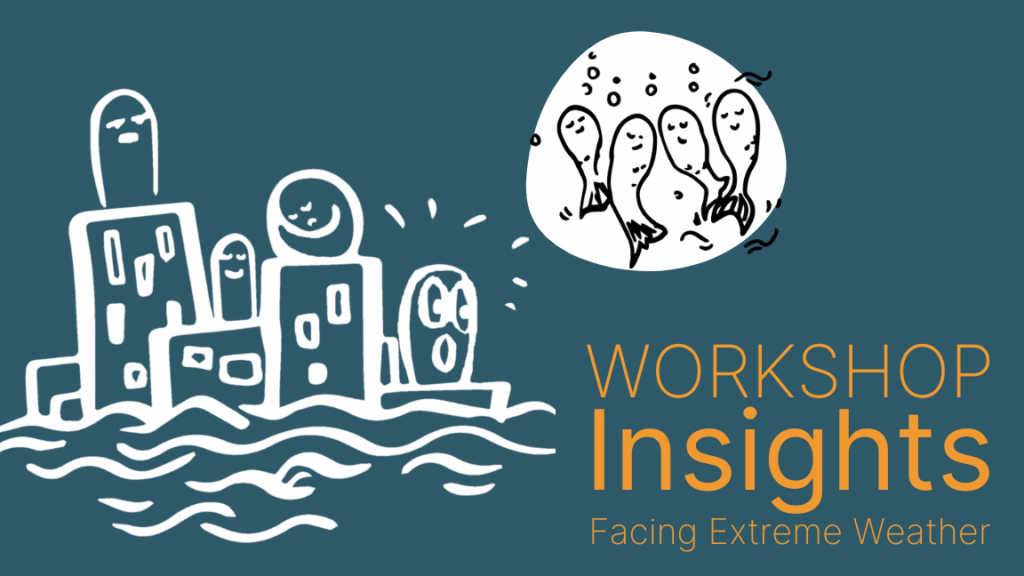The event is in the past. On this website we will share some insights, methods and follow-up ideas. The offline workshop was facilitated by Dean Spade and Anti War Hub and organized by Educat Kollektiv. The online workshop was facilitated by Dean Spade.
Content
In the context of worsening ecological crisis, rising fascism, and expanding war, we need to build communities and movements that can take care of each other and fight back. Mutual aid is the work we do in communities to meet immediate survival needs autonomous from government and NGO’s. It is where we practice skills of collaboration, generosity, and co-stewardship, engage in political education to expand our solidarities, and move from being passive observers of political crises to active participants in preparing for and addressing the disasters being caused by capitalism.


First picture: people are standing in the circle. In the middle there is a blue and white carpet. At the back there are slides projected on the wall.
Second picture: people are sitting in the circle on the chairs. In the middle there are colourful carpets, some people sit on these carpets. On the background there are colourful arches of windows.
This workshop consisted of three main parts.
In the first part Dean Spade will guide us through the basics of what mutual aid is. Why is it so important for social movements? What common obstacles come up in doing the work? And how we can address them?

In the second part a group from Anti War Hub will talk about organizing grassroots medical initiatives. How can we develop structures parallel to the state that can be an alternative to family doctors, large clinics, where everything is controlled either by the state or private companies? As well as about why it is important to take away the monopoly on your health from institutions. And how horizontal medicine or alternative medical structures can provide more stability in crisis situations and become a support for survival during large-scale crises.
In the third part we will get more practical and focus on concrete skills that we can develop to build a more resilient and strong civil society.
Workshop Journal
After warm-up we began with an input part from Dean about Mutual Aid. We talked about the general understanding of what mutual aid is and tried to talk about examples of mutual aid actions in different parts of the world. We also discussed why charity is not mutual aid and what is the difference between the two.
Zlata (Anti War Hub) – with the help of Tagvi translating the content – gave an input. We discussed that it seems important to start acquiring tactical surviving knowledge and share it with our comrades. No NGOs and no governments are able to react to crises fast enough. We need to learn more self-defence from the government.

In the last part we talked about giving and receiving feedback, about possible self-regulation in a conflict situation. We also discussed about the appropriate “size” of the reaction to conflict situations.
Aha Moments
- Charity is often celebrating the generosity of the rich and blaming poor people for being poor.
- What happens now often is that to defend our rights we turn to liberal institutions, which actually means that we rely on the state to back us up.
- When conflicts in groups happen, there is a fantasy, that the external person will become a truth finder.
- When I feel most victimised, I do most harm. And that’s the time I have to look for support.
Skillshare – What else is true?
The method is called “What else is true?”, it was suggested by Dean and described in his book. The tool helps to get a perspective when we’re tied up in knots. The situations where you can use it are the moments, for example, when you’re lying awake at night, because you’re being hurt or deeply involved in some conflict situation and you keep fixating on it. The feelings of anger, shame, fear, guilt or whatever else keep us awake and make our mind wander in circles. Our vision becomes very narrow. We’re focused mostly on very few things, which somehow make other things invisible.

The task would be to always draw a small circle with the answer to a question and then draw a bigger circle around it with an answer to a different question.
Part 1 – What else ist true?
Try to identify the thing that you’re feeling strongly about. Write it down, put it in a small circle. Then draw a second bigger circle around the first one and write down the answer to the following question there: What else is true about the person I’m focused on? or What else is true about the group? List positive qualities, benefits, or any other experiences that show a fuller picture.
Then draw a small circle again, write down the thing that you’re feeling strongly about in it. In the outer circle write down the answer to the question: What do I not know, that might be contributing to the situation. What do I not know about the other person’s/peoples’ intentions?
Draw a small circle again, write the thing you are feeling strongly about. In the outer circle, write what else is true now about your life, beyond this situation? What else do you have going on? Who else do you have as support? Who stands up for you? Who likes you?

Part 2 – Responsibilities
After you’re done with the circles, it is helpful to draw a table with two columns: my responsibility and not my responsibility. Some people might like to rip off the “not my responsibility” side of the sheet and throw it away or symbolically give up trying to control it.
Part 3 – Deeper Reflection
The next step of the method would be to write down notes about the following questions:
- Are there any sore spots from my history this situation might be rubbing against?
- Are there any ways I am in a familiar role in this situation? What feels familiar?
- How can I be kind to myself about those sore spots, or that history, during this period of activation?

Additional Materials
Presentations from the Workshop
The presentation “We are all we’ve got” from Dean Spade can be viewed as pdf with a click on the following link: https://skills4crisis.org/wp-content/uploads/2025/08/Strengthening-Civil-Society-Work-Presentation-Dean-Spade.pdf
The reader “Skills set we might need to self-organise medically” from Anti War Hub can be opened by a click on the following link: https://skills4crisis.org/wp-content/uploads/2025/08/Strengthening-Civil-Society-Work-Skills-set-we-might-need-to-self-organise-medically.pdf
Materials mentioned by Dean in the online workshop https://docs.google.com/document/d/1579l7ItrJXVdAiCaq-i1KQs25xXn_LTuHNnu9SWV0xc/edit?usp=sharing

Further Reads
- Mutual Aid Explainer video: https://www.youtube.com/watch?v=rYPgTZeF5Z0
- Mutual Aid: Building Solidarity During this Crisis (and the Next): https://theanarchistlibrary.org/library/dean-spade-mutual-aid
- Visual History of Mutual Aid: https://www.bloomberg.com/news/features/2020-12-22/a-visual-history-of-mutual-aid
Recording – Youtube Video
We recorded the input and published it on Youtube. The content is in the English language. On Youtube you can choose English Subtitles with a Click on the Symbol at the bottom saying “CC”.
Transcript of the input from Dean (without the group work and discussions in the chat)
Workshop Concept for your groups
From the experiences and content of the online and offline Workshop, we produced a Workshop Concept to share with you and your groups. It contains methods and proposals for timeslots and breaks.
Please address where you got it from, feel free to send us feedback or make your own changes. There is a short version and a longer one. You can find it in the “Resources” section or by a click on the following link: https://skills4crisis.org/resource/workshop-concept-strengthening-civil-society-work/. Below the pdf-Reader you can find the Link to download the pdf.
Facilitators
Dean Spade
Dean Spade has been working in movements for queer and trans liberation, anti-militarism, and police and prison abolition for the past 25 years.
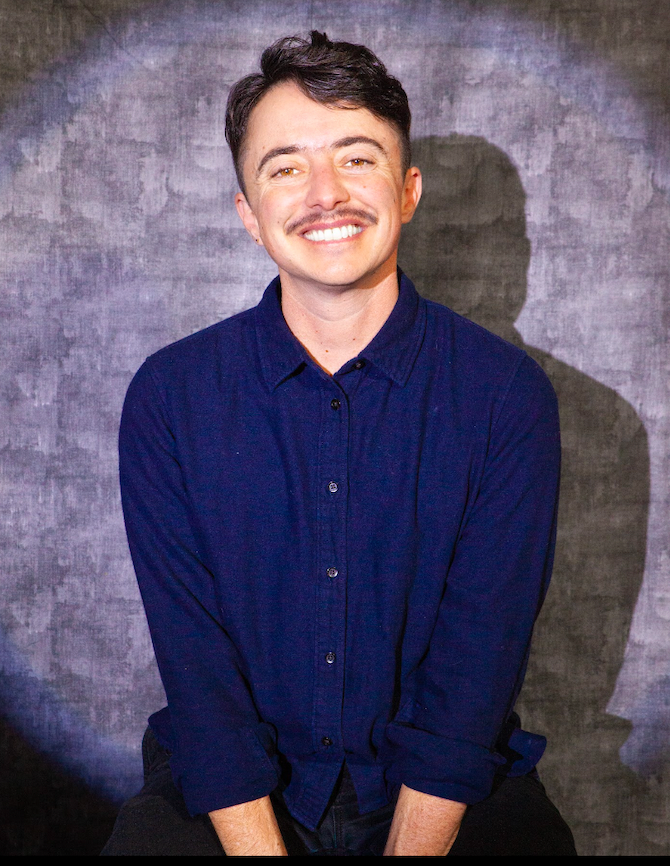
He’s the author of Normal Life: Administrative Violence, Critical Trans Politics, and the Limits of Law, and Mutual Aid: Building Solidarity During This Crisis (and the Next) (which is now available in Italian, Catalan, Spanish, and Czech, German, Portuguese, Korean, and Thai), the director of the documentary“Pinkwashing Exposed: Seattle Fights Back!.”
His new book is Love in a Fucked Up World: How to Build Relationships, Hook Up and Raise Hell Together, and he is the host of a new podcast with the same name.
Anti War Hub
Tagvi (they/them):
Tagvi is a translator, editor, and conflicts researcher based in Germany. They speak Russian as their native and English as their second language, and have substantial experience in translating and interpreting in both activist and academic contexts. Valuing autonomy, they are committed to teaching themselves essential medical and other survival skills and passing the knowledge forward to others.
Zlata:
In Russia, I had been working in harm reduction and coordinating the AIDS service organisation for children and teenagers. I was also involved in animal rescue projects and was a part of a non-hierarchical restaurant. After I fled Russia, I had been living in the commune in the village. We have been growing food ourselves, equipping autonomous life for our community, saving animals and trying to help people. At the same time, we were conducting courses on permaculture, discussing apocalypse and crisis.
I do not have any professional connection to medicine. Neither I am an expert in organisation work in public health care, nor have I graduated from a medical university, but I know enough to understand our need to prepare ourselves for the upcoming crisis. I know enough to perceive the urgency of ensuring one’s survival and health when governments do not help. I do not have readymade instructions to the functioning of the autonomous health care system, but I have an understanding where to search for possible solutions and which skills are worth developing.
During the meeting I will evaluate what we have already achieved and what we need to improve. I will also tell about some projects in progress at the moment and open a discussion on autonomous health care and medicine.
Educat Kollektiv
Masha
Masha moved to Germany in July 2023 and joined our collective in the fall. In Belarus and Georgia, she is involved in informal education, human rights activities, and remembrance work. She is now active in the collective in Dresden and has accompanied two of our major projects on remembrance work, “Cultures of Remembrance” and “Queer Identities in Darkest Times.”
